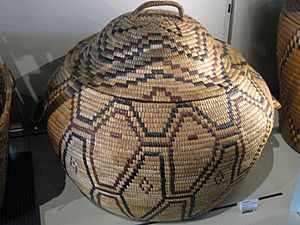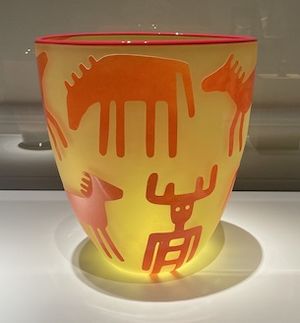Joe Feddersen facts for kids
Quick facts for kids
Joe Feddersen
|
|
|---|---|
| Born |
Joe Feddersen
1953 (age 72–73) |
| Nationality | Colville |
| Education | BFA University of Washington, MFA University of Wisconsin–Madison |
| Known for | Mixed-media, painting, photography, sculpture, basketry, glass |
Joe Feddersen, born in 1953, is a talented artist from the Colville tribe. He creates amazing art using many different styles, like sculpture, painting, and photography. Joe is famous for his art that uses strong geometric patterns. These patterns often show things he sees in nature and reflect his Native American background.
Contents
About Joe Feddersen
His Early Life and Education
Joe Feddersen grew up in Washington state. His father was German American, and his mother was from the Okanagan and Sinixt tribes.
He first learned about printmaking at Wenatchee Valley College. There, he studied with an artist named Robert Graves. Joe then went to the University of Washington. In 1983, he earned his Bachelor of Fine Arts degree. He continued his studies at the University of Wisconsin–Madison. In 1989, he received his Masters of Fine Arts. After finishing school, he became an art teacher at The Evergreen State College.
Life Today
When Joe Feddersen isn't making art or teaching, he's also a writer and a consultant. He is an active member of the Colville Confederated Tribal Arts & Humanities Board. In 2001, he won an important award called the Eiteljorg Fellowship for Native American Fine Art.
In 2009, Joe left his teaching job at Evergreen State College. He moved back to his hometown, Omak, Washington. While he still teaches sometimes, he now focuses on working with glass. He is involved with the Pilchuck Glass School and the Museum of Glass.
Joe Feddersen's Art Journey
His First Artworks
In the early 1980s, Joe Feddersen started with photography and collage self-portraits. These early pieces explored how people connect with their surroundings. His first big project was a series called "Rainscape." These were lithographs shown at the Heard Museum.
In "Rainscape," Joe used blended colors to create a rainy landscape. This style reminded people of the Pacific Northwest where he lived. This series helped Joe become known in the art world. Art critics praised his use of color and compared his work to famous artists.
Printmaking Art
In the early 1990s, Joe made a series of monoprints. These prints were inspired by the blanket designs of the Plains Indians and Pendleton Woolen Mills. They featured strong geometric shapes and layered, blended colors.
Later in the 1990s, Joe created the "Plateau Geometrics" series. Each print in this series is unique. He used many different printmaking methods, like etching and linocuts. The prints show geometric patterns over a grid. Some are flat, while others have a lot of texture.
Joe said these works reminded him of living on the reservation. At the time, he was in Seattle, far from his home. The geometric patterns in his art are like those found in Colville basketry and cornhusk bags. This series shows how Joe connects his traditional culture with modern art.
Sculpture and Basketry

Joe started making baskets in the 2000s. He learned Plateau-style techniques from artist Elizabeth Woody. More recently, he has focused on making art with glass. He gets ideas from designs in Plateau Indian art.
He creates art with repeating patterns. His pieces have interesting titles like Cul-de-Sac and Tire. These titles show how he mixes traditional Colville basketry with ideas about modern life.
Major Art Shows
Joe Feddersen's art has been shown in many important places. Here are some of them:
2023
- "Sharing Honors and Burdens: Renwick Invitational 2023", Renwick Gallery Smithsonian Institution.
2010
- Across Cultures: Fifty Objects from the Macy Collection, Northern Arizona University
- Infinity of Nations, National Museum of the American Indian, New York.
- Joe Feddersen: Vital Signs, Hallie Ford Museum of Art
2008
- Joe Feddersen: Vital Signs, Missoula Art Museum
2006
- Made at the Museum: Northwest Selections, Museum of Glass
2005
- Art Objects, Portland International Airport
- Changing Hands 2: Art Without Reservation, Museum of Arts and Design
- Land Mark, Northwest Museum of Arts and Culture
2003
- Continuum, National Museum of the American Indian
2002
- Lasting Impressions, Cornell University
2001
- After the Storm, Eiteljorg Museum of American Indians and Western Art
1991
- Our Land/Ourselves, University at Albany, SUNY
1987
- 3rd Biennial Native American Fine Art Invitational, Heard Museum
1986
- New Directions/Northwest, Portland Art Museum
1984
- No Beads, No Trinkets, Palais des Nations
His work has also been shown in many private galleries. Other public places include the Whatcom Museum of History and Art and Simon Fraser University.
Where His Art Is Kept
- Eiteljorg Museum of American Indians and Western Art
- Hallie Ford Museum of Art
- Harborview Medical Center
- Heard Museum
- Johnson & Johnson Corporation
- Kaiser Sunnyside Medical Center
- Merrill Lynch
- Microsoft Corporation
- National Museum of the American Indian
- Northwest Museum of Arts and Culture
- Pacific Northwest Bell
- Peabody Essex Museum
- Portland Art Museum
- Seattle Art Museum
- Tacoma Art Museum
- University of Hawaii
- University of Western Sydney
- U.S. Department of the Interior
- U.S. Department of State
- Whitney Museum of American Art
His art is also part of collections in the cities of Portland, Seattle, and Ephrata, Washington.
Awards Joe Feddersen Has Won
- John H. Hauberg Fellowship, 2009, Pilchuck Glass School
- Eiteljorg Native American Fine Art Fellowship, 2001, Eiteljorg Museum
 | Kyle Baker |
 | Joseph Yoakum |
 | Laura Wheeler Waring |
 | Henry Ossawa Tanner |


